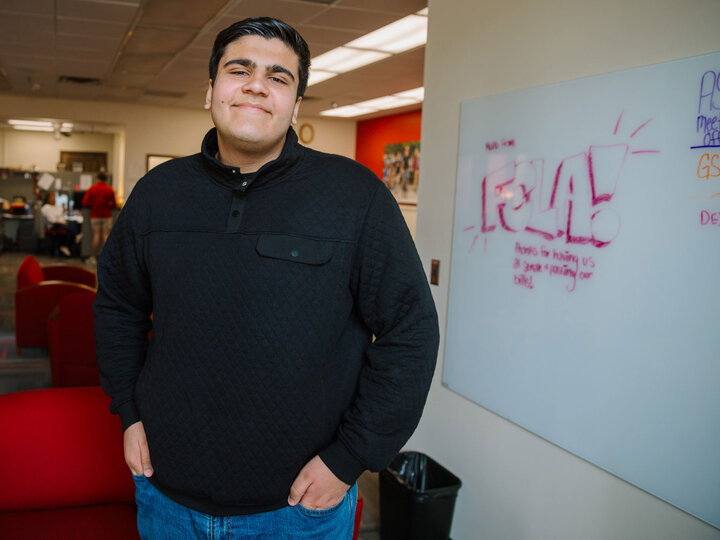Research fellowships provide financial support and resources for undergraduate or graduate students to conduct advanced research, which we will define here as any original, creative, or innovative work, in their field(s) of interest.
Deep Engagement in Original Work
Applicants for these nationally-competitive awards typically have one or more years of prior research or creative experience, which might include engagement in formal undergraduate research programs like FYRE or UCARE, undergraduate thesis activities, or internships focused on innovative or creative work. Research should be a core element of the student’s undergraduate and/or graduate degree plan.
Research-Focused Careers
Whether applicants intend to work in academia, government, nonprofit or industry contexts, they can articulate the relevance of new knowledge creation for their long-term career intentions. Example career goals include professor, clinical researcher, psychologist, government or “think-tank” scientist, engineer or product designer, software developer, or director of research and development.
Graduate School Ambitions
Most applicants intend to pursue graduate school through doctor of philosophy (Ph.D.)-level studies. (In some fields, such as arts, engineering, or computer science, students may instead choose a research-based master’s program, with an original thesis or capstone project as the culmination of their graduate studies.)
Additional Benefits
Besides tuition support, many research fellowships also include living expenses, leadership and networking events, conference travel, and/or support for publishing research findings. These benefits enhance career opportunities and collaborations.


Eligibility Notes
Some research awards are designed to increase the number of American students pursuing research careers in areas of critical need for the United States; thus, many of these awards only allow applications from U.S. citizens or permanent residents.
Class year is determined by intended graduation date, not coursework units completed. Individuals whose plans do not exactly fit a four-year degree plan can refer to these guidelines.
- A first year (or freshman) will graduate between December and August, three or more academic years from now.
- A sophomore will graduate between December and August, two academic years from now.
- A junior will graduate between December and August, one academic year from now.
- A graduating senior will receive a bachelor’s B.A. or B.A. degree between December and August in the current/upcoming academic year, and/or will proceed to master’s coursework if participating in a 4+1 degree plan.
- An alumnus/a has already received a bachelor’s (B.S. or B.A.) degree and is not currently enrolled in any academic degree program.
Research Fellowships
Beinecke Scholarship
Supports U.S. juniors with demonstrated financial need who intend to pursue arts, humanities, or social sciences master’s (M.A., M.S., or M.F.A.) or doctoral (Ph.D) programs.
External Deadline: Late March.
Advising & Campus Nomination: Mid-October – Mid-March.
Funding Source: Private Foundation (Sperry Fund)
Carnegie Endowment for International Peace: James Gaither Junior Fellows Program
Provides graduating seniors or recent alumni with a paid, full-time social sciences research assistant position at the Carnegie Endowment in Washington, D.C.
External Deadline: Mid-January.
Advising & Campus Nomination: Mid-October – early January.
Funding Source: Private Foundation (Carnegie Endowment)
Churchill Scholarship
Supports U.S. graduating seniors or recent alumni with full tuition and travel support for STEM master’s study at the University of Cambridge in the United Kingdom.
External Deadline: November 1.
Advising & Campus Nomination: Mid-May – Late October.
Funding Source: Private Foundation (Winston Churchill Foundation)
Department of Defense (DoD) SMART Scholarship
Provides undergraduate or graduate students with a full tuition scholarship, paid summer internship, and guaranteed employment at Department of Defense (DoD) laboratories.
External Deadline: December 1.
Advising: Mid-August – Late November.
Funding Source: Federal (Department of Defense)
Goldwater Scholarship
Supports U.S. sophomores and juniors who show exceptional promise of becoming research leaders in the natural sciences, engineering, and mathematics.
External deadline: Late January.
Events, Advising, and Campus Nomination: Late October – Late January.
Funding Source: Independent Federal Agency (Barry Goldwater Scholarship and Excellence in Education Foundation) and Federal (Department of Defense)
Hertz Fellowship
Provides up to five years of support for U.S. graduating seniors or graduate students who plan to pursue Ph.D. degrees in STEM fields and demonstrate potential to create transformative solutions to the world's most urgent challenges.
External Deadline: Late October.
Advising: Mid-August – Late October.
Funding Source: Private Foundation (Fannie and John Hertz Foundation)
National Defense Science and Engineering (NDSEG) Graduate Fellowship
Supports U.S. graduating seniors and graduate students who are pursuing Ph.D. degrees in STEM fields related to Department of Defense research development priorities.
External Deadline: Early November.
Advising: Mid-August – Late October.
Funding Source: Federal (Department of Defense)
National Institutes of Health (NIH) Undergraduate Scholarship
Provides an income-restricted scholarship and paid summer internship for U.S. undergraduates who are committed to careers in biomedical, behavioral, and social science research.
External Deadline: Mid-March.
Advising (by appointment): Mid-January – Mid-March.
Funding Source: Federal (National Institutes of Health)
National Oceanic & Atmospheric Administration (NOAA) Hollings Scholarship
Provides a scholarship and paid summer internship to U.S. sophomores majoring in STEM or teacher education fields related to NOAA's programs and mission.
External Deadline: February 1.
Advising (by appointment): Late October – Late January.
Funding Source: Federal (National Oceanic and Atmospheric Administration)
National Science Foundation (NSF) Graduate Research Fellowship Program (GRFP)
Provides up to three years of support for U.S. graduating seniors or graduate students who plan to pursue research-based (M.S. or Ph.D.) degrees in STEM, STEM education, or social sciences fields.
External Deadline: Late October.
Advising: Early July – Late October.
Funding Source: Federal (National Science Foundation)